Join us Friday, March 6 for History under Siege!
06.02.2026 20:26 — 👍 6 🔁 3 💬 0 📌 1differences
@differences.bsky.social
a journal of feminist cultural studies | https://differencesjournal.org
@differences.bsky.social
a journal of feminist cultural studies | https://differencesjournal.org
Join us Friday, March 6 for History under Siege!
06.02.2026 20:26 — 👍 6 🔁 3 💬 0 📌 1If you’re in the vicinity, we’d love to see you at Limits of Legibility #3!
16.01.2026 01:40 — 👍 6 🔁 2 💬 0 📌 0
This image is a poster for a colloquium titled "Limits of Legibility: History under Siege." White and yellow text on black background. The description reads: "How does critical history address the impasse between conventional history, on the one hand, and aggressive authoritarian rewriting of history, on the other? Given critical history’s theoretical critique of the positivist understanding of facts, what is its response to the assertion of 'alternative facts'? And what impact, if any, can it have on current battles as to what counts as history?" Below this description is a list of participants: Joan W. Scott (Insitute for Advanced Study), Omnia El Shakry (Yale University), Gary Wilder (CUNY Grad Center), and Korey Williams (University of Chicago). The event will take place on March 6th from 2pm to 6pm at Brown University in Pembroke Hall 305.
join us in Providence on March 6th for Limits of Legibility: History under Siege — a colloquium featuring Joan Wallach Scott, Omnia El Shakry, Gary Wilder, and Korey Williams: events.brown.edu/pembroke/eve...
15.01.2026 20:11 — 👍 6 🔁 6 💬 0 📌 2
Cover of Differences journal issue with yellow background, horizontal gray band, title Lyric beyond Containment, and contributor names listed.
The Weekly Read is “The Americanity of the 'American Lyric': Claudia Rankine in Ibero-American Translation” by Whitney Devos. The article appears in Lyric beyond Containment, a special issue of @differences.bsky.social (36:2-3). Read it for free: buff.ly/hj5wL6r
27.12.2025 14:01 — 👍 11 🔁 5 💬 0 📌 0
Cover of Differences journal issue with yellow background, horizontal gray band, title Lyric beyond Containment, and contributor names listed.
"Lyric beyond Containment," a special issue of differences edited by Sarah Dowling and Claire Grandy, is now available. View the TOC, read the intro, and "The Americanity of the 'American Lyric',"all freely available: buff.ly/3RkT2Hv
10.12.2025 14:00 — 👍 17 🔁 9 💬 1 📌 0Our special issue of differences is out! Claire and I were asked to suggest one article that would be open access, and (although it was VERY hard to choose) we picked Whitney’s, which is about Claudia Rankine’s “American lyric” in Ibero-American translation:
read.dukeupress.edu/differences/...
I’m proud to be part of this issue
07.12.2025 12:09 — 👍 10 🔁 2 💬 0 📌 0
Cover of Lyric beyond Containment, a special issue of differences: A Journal of Feminist Cultural Studies, volume 36, issue 2–3. A yellow cover with black text.
differences 36.2–3 is out now — edited by Sarah Dowling and Claire Grandy, "Lyric beyond Containment" features essays from Jacques Khalip, David Marriott, Andrea Brady, Amy De'Ath, Whitney DeVos, Jan Mieszkowski, Ren Ellis Neyra, Susan Briante, more: read.dukeupress.edu/differences/...
06.12.2025 15:11 — 👍 13 🔁 7 💬 0 📌 2
Screenshot of proofs of the intro to the Lyric beyond Containment special issue of differences, by Sarah Dowling & Claire Grandy
If you’re ASAP-ing, join Claire & I & our assembled luminaries for the Lyric beyond Containment seminar on Friday! We’ll be sharing material from our forthcoming special issue of @differences.bsky.social, I’ll share a bit from Here Is a Figure, & there’ll be previews of some fab books in poetics!
20.10.2025 14:49 — 👍 7 🔁 2 💬 0 📌 1
Publication date: Nov 4, 2025 🎉
13.08.2025 18:20 — 👍 16 🔁 5 💬 1 📌 6
An excerpt from the linked article, which reads: "My argument is not for a body emptied of its social markers, as these come to the fore in and thorugh Ibarra’s performance. As she tends toward the edge of meaning, Ibarra’s racialized and gendered body becomes resignified in multiple and sometimes surprising ways. Indeed, Ibarra herself has described the origin of the piece as an attempt to grapple with the ongoing burden of white womanhood that women of color must bear. Yet, as I will show, the ways in which laughter taxes and exhausts the body move beyond this intention to produce another set of meanings that have become apparent as Ibarra has continued to perform the piece. In other words, Nude Laughing also reveals how the fraught social relations of race and gender are reproduced and perhaps inevitably made abject. So even if the ways in which a laughing body exceeds the limits of subjectivity are at the heart of this essay, the social world we inhabit reveals that attempting to think beyond the violence of sociality is itself fraught and impossible."
"Laughter […] lingers in the racialized, sexualized, and gendered spaces of abjection that drive the subject to the edges of meaning" — from our latest issue, read Iván A. Ramos's "Breaking Down, Breaking Together" here: read.dukeupress.edu/differences/...
07.08.2025 18:03 — 👍 7 🔁 4 💬 0 📌 0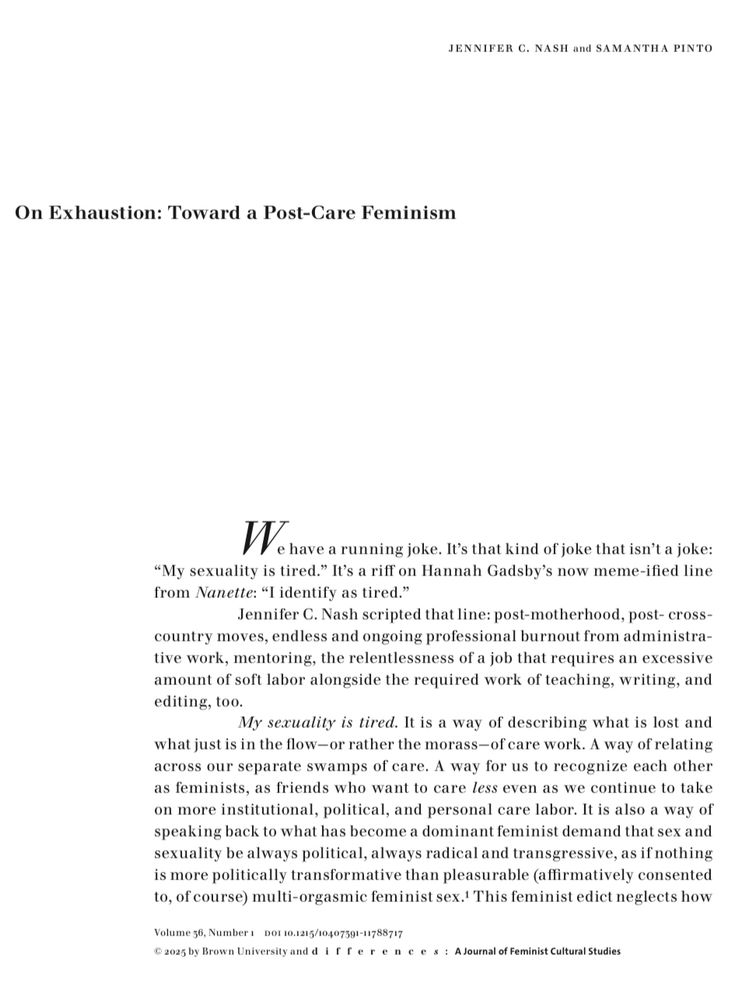
“What is a feminist theory of exhaustion?…We are exhausted from feminism but decidedly not taking a ‘break’ from its demands. We are doing it tired.” Incredible essay by Jennifer C. Nash & Samantha Pinto in @differences.bsky.social. Free to read: read.dukeupress.edu/differences/...
28.07.2025 17:49 — 👍 6 🔁 3 💬 1 📌 0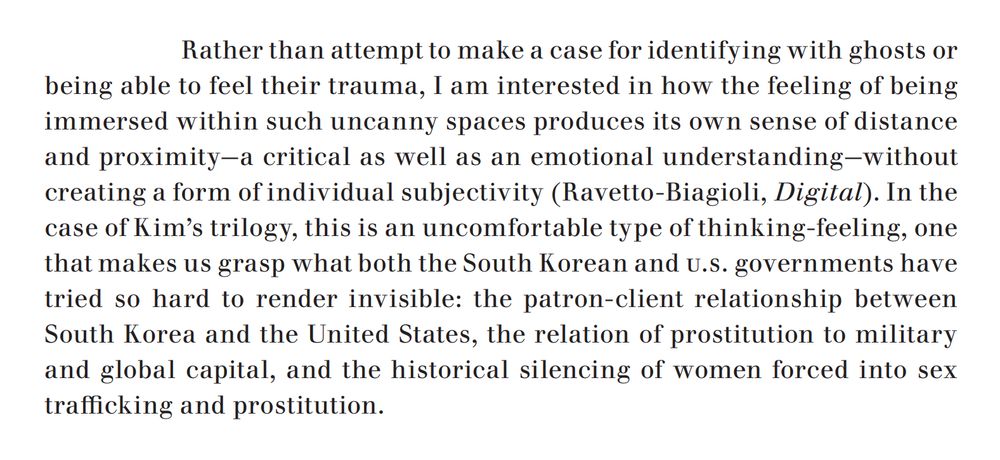
An excerpt from the linked article, which reads: "Rather than attempt to make a case for identifying with ghosts or being able to feel their trauma, I am interested in how the feeling of being immersed within such uncanny spaces produces its own sense of distance and proximity—a critical as well as an emotional understanding—without creating a form of individual subjectivity. In the case of Kim’s trilogy, this is an uncomfortable type of thinking-feeling, one that makes us grasp what both the South Korean and U.S. governments have tried so hard to render invisible: the patron-client relationship between South Korea and the United States, the relation of prostitution to military and global capital, and the historical silencing of women forced into sex trafficking and prostitution."
"Kim’s work does not allow us to inhabit the virtual spaces we see before us. Instead, her rendering of space and the various ghosts that haunt those spaces seem to take possession of our bodies" — read Kriss Ravetto-Biagioli's "Spectral Forensics" here: read.dukeupress.edu/differences/...
28.07.2025 15:17 — 👍 5 🔁 1 💬 0 📌 0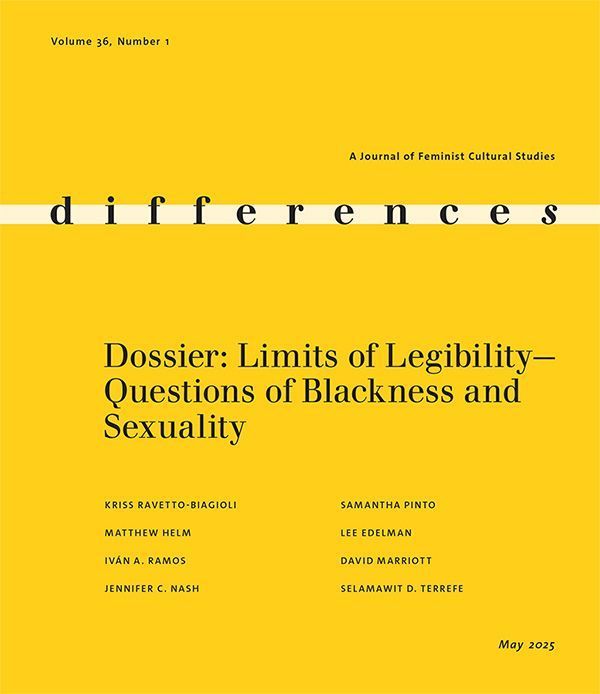
Cover of differences: A Journal of Feminist Cultural Studies, Volume 36, Number 1 (May 2025). The background is solid yellow with a horizontal beige band across the middle containing the journal title "differences" in lowercase serif letters. Below the band, the issue’s featured dossier is titled "Limits of Legibility—Questions of Blackness and Sexuality," with contributing authors listed: Kriss Ravetto-Biagioli, Matthew Helm, Iván A. Ramos, Jennifer C. Nash, Samantha Pinto, Lee Edelman, David Marriott, and Selamawit D. Terrefe.
The Weekly Read is "On Exhaustion: Toward a Post-Care Feminism" by Samantha Pinto and Jennifer C. Nash. The article was published in Dossier: Limits of Legibility—Questions of Blackness and Sexuality, a special issue of @differences.bsky.social (36:1).
Read the article for free: buff.ly/XDrQAhF

Text reads Welcome to our newest staff members and has an arrow indicating that there are more images to come.

Headshot of Scott Jackshaw, Managing Editor of differences

Headshot of Erin Perfect, Processing Archivist
We are delighted to welcome two new Center staff. Scott Jackshaw joins differences as Managing Editor; Erin Perfect joins the archives team as Processing Archivist. Read about Scott : pembroke.brown.edu/news/2025-07... Read about Erin: pembroke.brown.edu/news/2025-05...
@differences.bsky.social
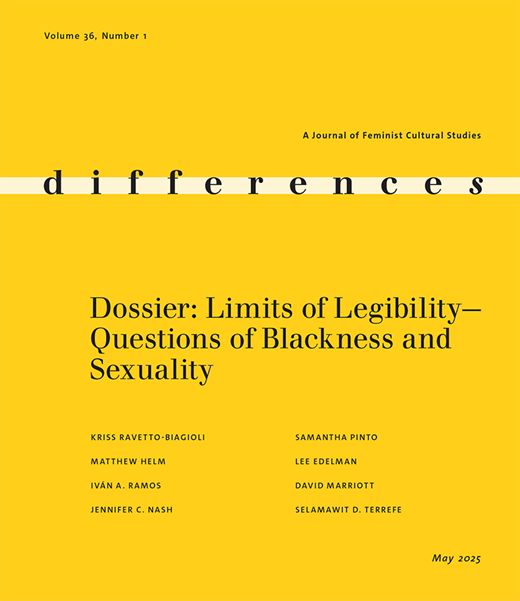
To read: this interview of Elizabeth Weed and Elizabeth A. Wilson, differences editors, by Eugenia Zuroski, president of the Council of Editors of Learned Journals. www.celj.org/featured-jou.... differences is CELJ's newest featured journal. @differences.bsky.social
@elizwilsonemory.bsky.social

Cover of differences: A Journal of Feminist Cultural Studies, Volume 36, Number 1 (May 2025). The background is solid yellow with a horizontal beige band across the middle containing the journal title "differences" in lowercase serif letters. Below the band, the issue’s featured dossier is titled "Limits of Legibility—Questions of Blackness and Sexuality," with contributing authors listed: Kriss Ravetto-Biagioli, Matthew Helm, Iván A. Ramos, Jennifer C. Nash, Samantha Pinto, Lee Edelman, David Marriott, and Selamawit D. Terrefe.
"Dossier: Limits of Legibility—Questions of Blackness and Sexuality," a special issue of @differences.bsky.social (36:1), is now available! View the TOC and read "Ce n’est pas ça: Blackness, Sex, and the Set of Illegibles" by Lee Edelman, freely available through 9/5: buff.ly/FhdR7Ft
05.06.2025 16:01 — 👍 16 🔁 8 💬 0 📌 0New piece written with my most precious and treasured thinking partner, @samanthapinto.bsky.social. Thinking together about exhaustion, fatigue, and being feminist and bone tired.
01.06.2025 15:01 — 👍 28 🔁 11 💬 0 📌 1"Limits of Legibility: Questions of Blackness and Sexuality" is dedicated to the memory of Selamawit D. Terrefe.
02.06.2025 18:57 — 👍 6 🔁 2 💬 0 📌 0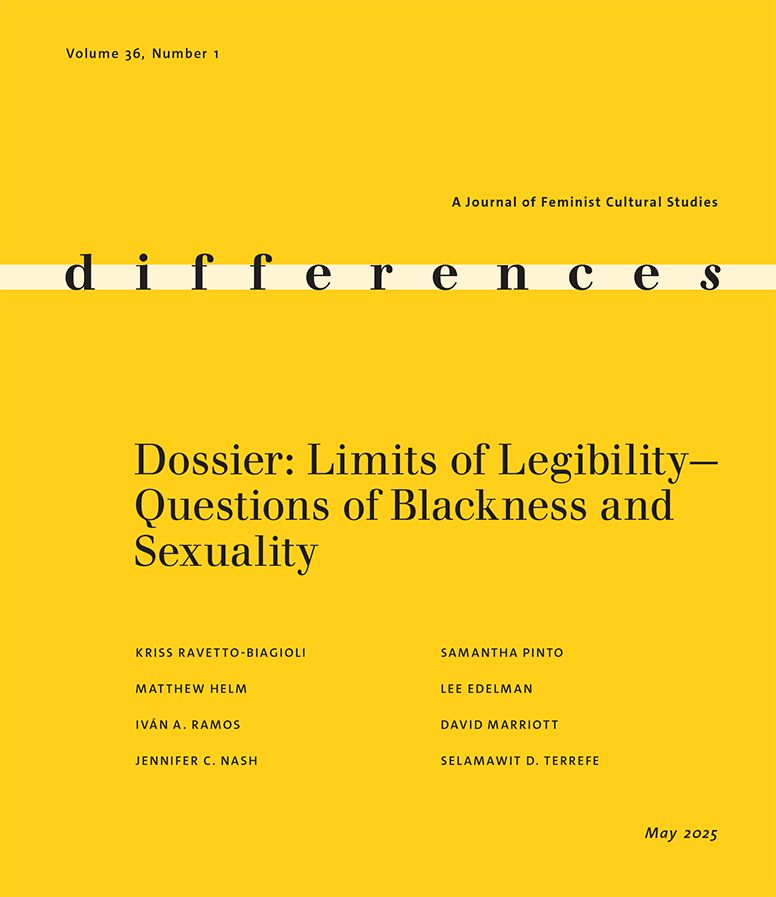
Cover of differences: A Journal of Feminist Cultural Studies, volume 35, number 3. A pale yellow bar with the journal's title in black crosses over the top quarter. Below the title, black text on a yellow background offers the issue's subtitle: "Dossier: Limits of Legibility—Questions of Blackness and Sexuality."
differences 36.1 is out now — featuring a dossier of essays from Selamawit D. Terrefe, David Marriott, and Lee Edelman, alongside writing from Jennifer C. Nash, Samantha Pinto, Kriss Ravetto-Biagioli, Matthew Helm, and Iván A. Ramos: read.dukeupress.edu/differences/...
02.06.2025 18:57 — 👍 25 🔁 10 💬 1 📌 1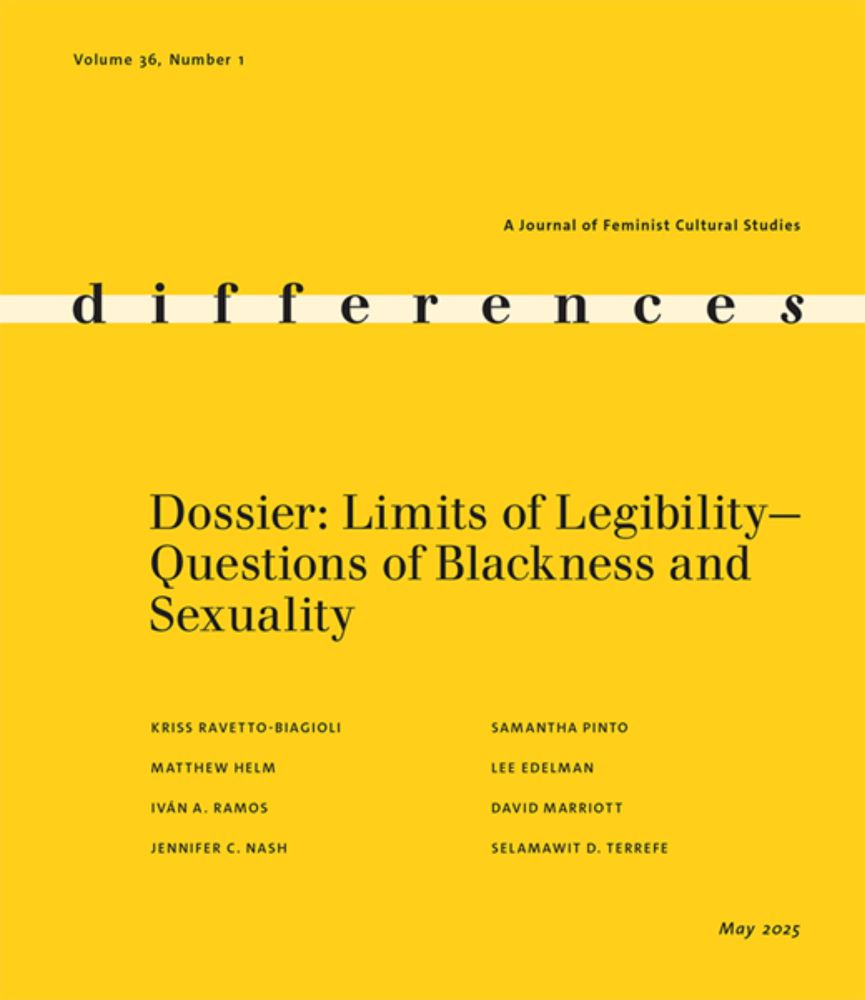
We thought we knew tired when we wrote this. Exhausted with @jennifercnash.bsky.social @differences.bsky.social doi.org/10.1215/1040...
01.06.2025 14:37 — 👍 18 🔁 12 💬 1 📌 3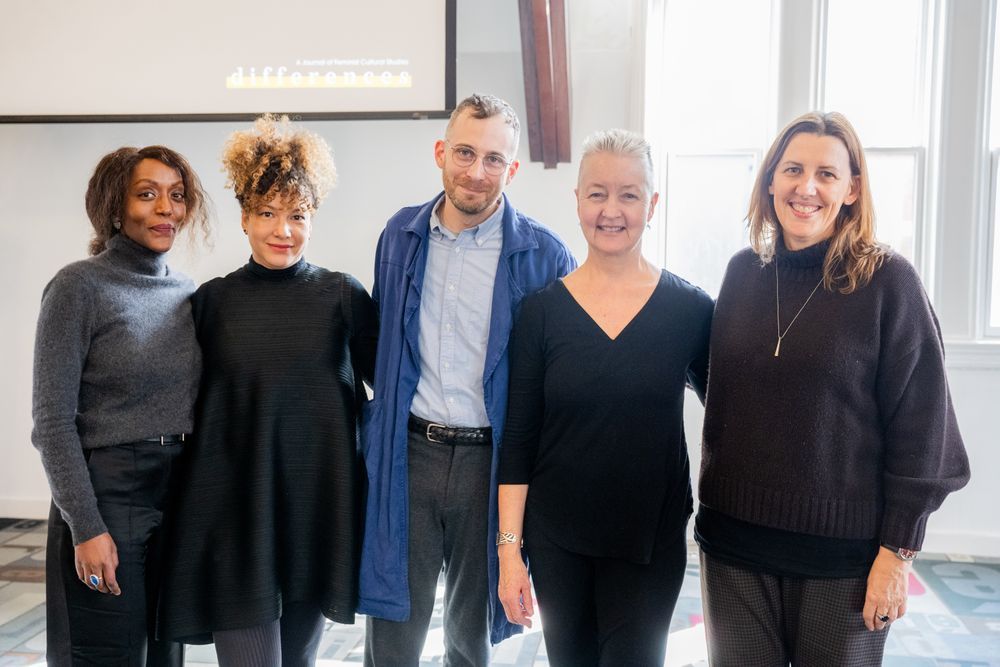
From left: Axelle Karera (Emory), Dixa Ramírez D’Oleo (Brown), Jean-Thomas Tremblay (York), Lynne Huffer (Emory), and Elizabeth A. Wilson (Emory; moderator).
Thanks to the panelists and moderator for the second differences colloquium: The Climate of Critique. Video coming soon! @jttremblay.bsky.social @elizwilsonemory.bsky.social
12.03.2025 12:00 — 👍 10 🔁 2 💬 0 📌 0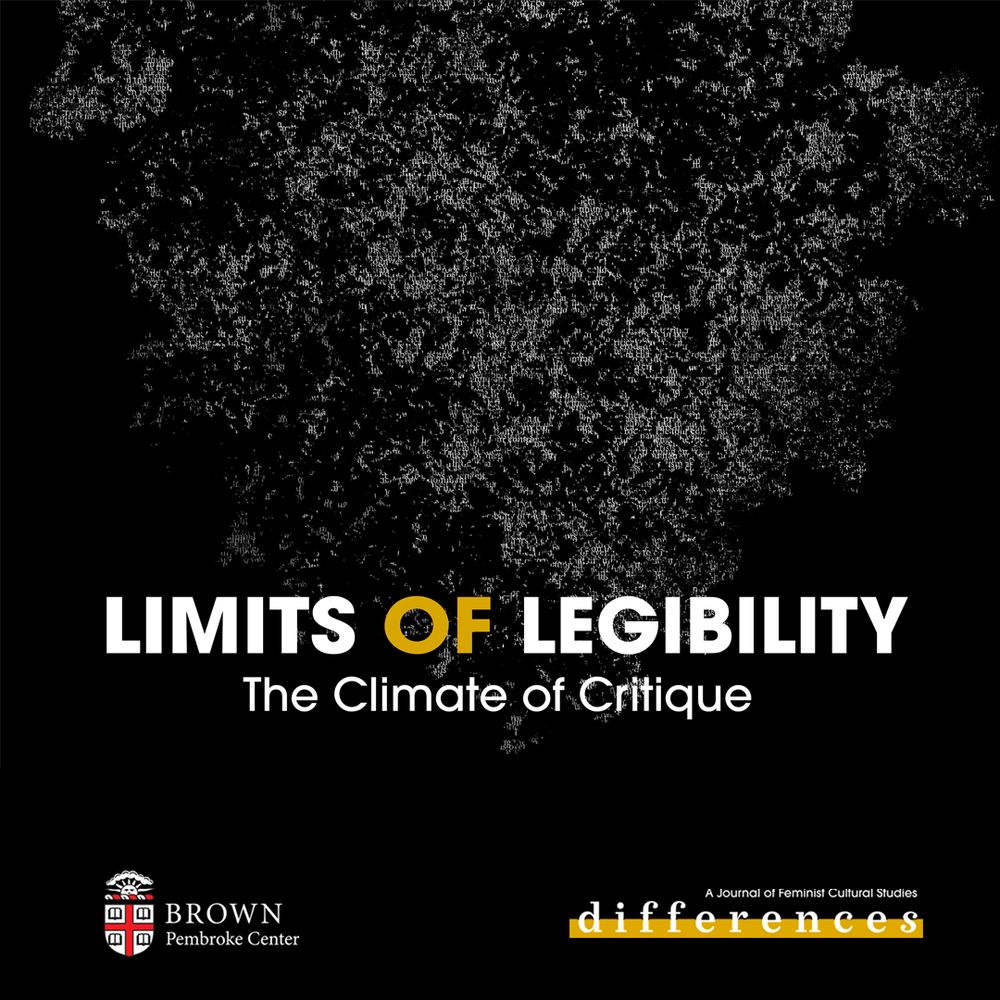
Poster for a colloquium titled "Limits of Legibility: The Climate of Critique." White and yellow text on black background. Logos in the bottom corners indicate that the event is sponsored by differences: A Journal of Feminist Cultural Studies and the Pembroke Center at Brown University.
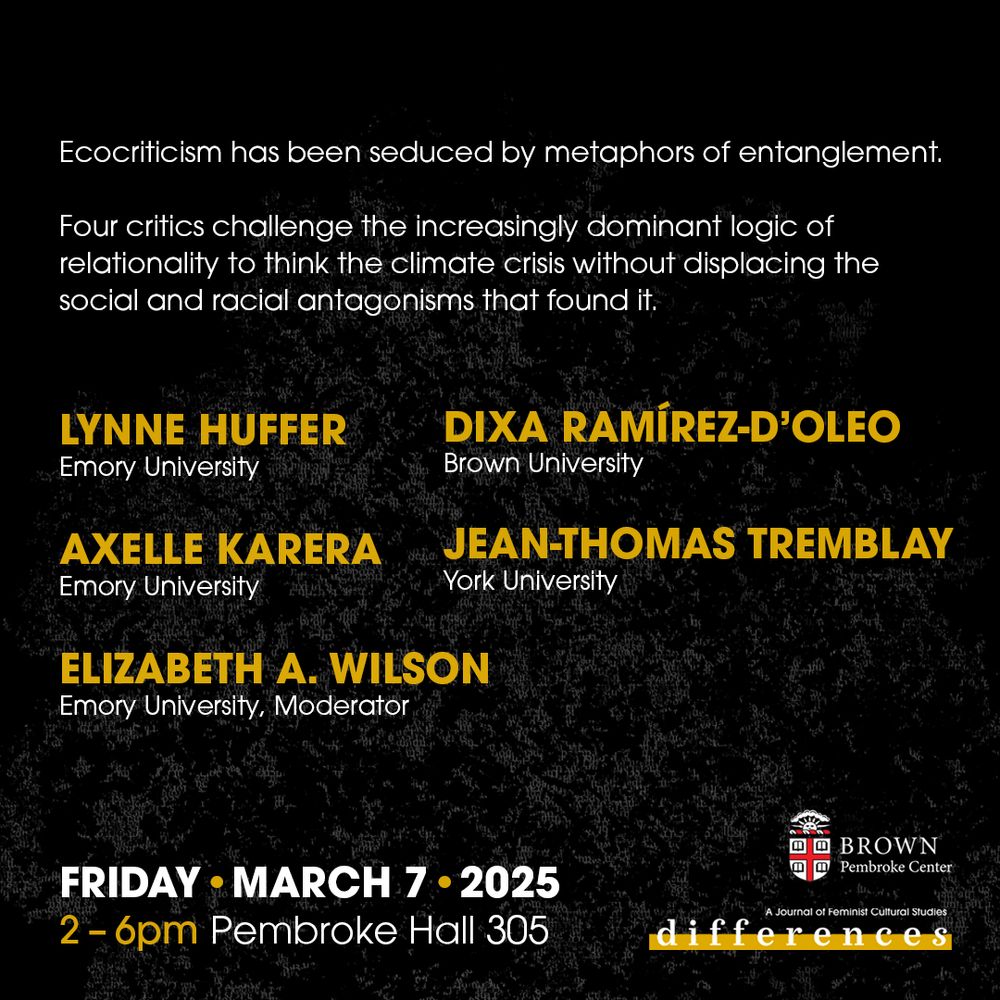
Poster for a colloquium titled "Limits of Legibility: The Climate of Critique." White and yellow text on black background. The description reads: "Ecocriticism has been seduced by metaphors of entanglement. Four critics challenge the increasingly dominant logic of relationality to think the climate crisis without displacing the social and racial antagonisms that found it." Below this description is a list of participants: Lynne Huffer (Emory), Axelle Karera (Emory), Dixa Ramírez D’Oleo (Brown), and Jean-Thomas Tremblay (York), with Elizabeth A. Wilson (Emory) moderating. The event will take place on March 7th from 2pm to 6pm at Brown University in Pembroke Hall 305.
join us in Providence on March 7th for Limits of Legibility: The Climate of Critique — a colloquium featuring Lynne Huffer, Axelle Karera, Dixa Ramírez D’Oleo, and Jean-Thomas Tremblay, moderated by Elizabeth A. Wilson: events.brown.edu/pembroke/eve...
03.02.2025 18:22 — 👍 12 🔁 5 💬 0 📌 3Join us for The Climate of Critique in two weeks feat. Lynne Huffer, Axelle Karera, Dixa Ramírez D’Oleo, and Jean-Thomas Tremblay, moderated by Elizabeth A. Wilson.
21.02.2025 17:21 — 👍 14 🔁 5 💬 0 📌 0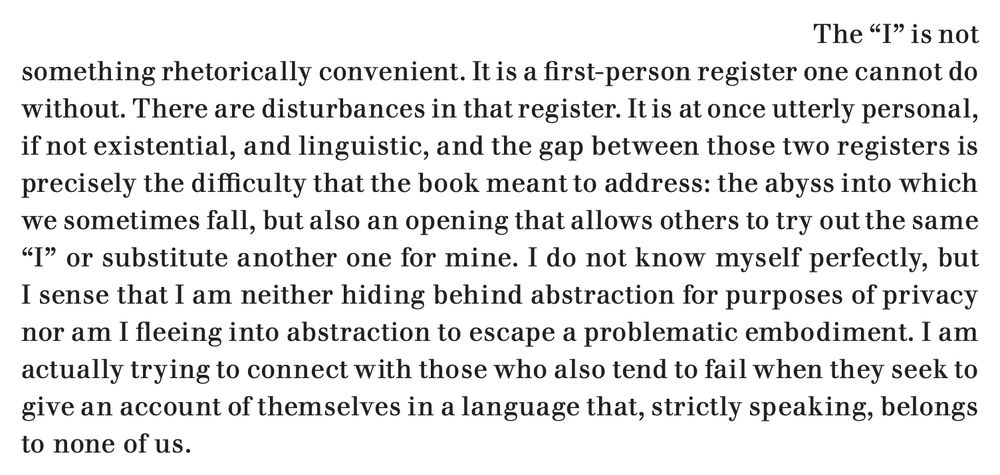
An excerpt from the linked article, which reads: "The 'I' is not something rhetorically convenient. It is a first-person register one cannot do without. There are disturbances in that register. It is at once utterly personal, if not existential, and linguistic, and the gap between those two registers is precisely the difficulty that the book meant to address: the abyss into which we sometimes fall, but also an opening that allows others to try out the same 'I' or substitute another one for mine. I do not know myself perfectly, but I sense that I am neither hiding behind abstraction for purposes of privacy nor am I fleeing into abstraction to escape a problematic embodiment. I am actually trying to connect with those who also tend to fail when they seek to give an account of themselves in a language that, strictly speaking, belongs to none of us."
"It was difficult to write Giving an Account of Oneself, since I included very little autobiographical detail" — from our latest issue, read Judith Butler's "Giving an Account: When, Where, for Whom, and Why?" here: read.dukeupress.edu/differences/...
17.02.2025 16:57 — 👍 2 🔁 1 💬 0 📌 0![An excerpt from the linked article, which reads: "Generally, antinarrative theorists define queerness as a force of negativity that ruptures the illusory structures of identity (see Edelman, No and Bad). Narrative perpetuates these structures by promising a satisfying closure that will never arrive. Butler similarly challenges the desire for 'narrative closure for our lives' (Giving 64). They are especially critical of those who idealize a coherent, definitive life story as key to a healthy psyche. In fact, they go so far as to suggest that 'something we might tentatively call the truth of the person [ . . . ] might well become more clear in moments of interruption, stoppage, open-endedness—in enigmatic
articulations that cannot easily be translated into narrative form.' While
they embrace the enigmas that exceed narration, Butler nonetheless refuses 'to celebrate a certain notion of incoherence' as a queer ideal. Rather than opposing incoherence to identity, Butler defines incoherence as the existential price of our relational being. In their words, '[O]ur ‘incoherence’ establishes the way in which we are constituted in relationality: implicated, beholden, derived, sustained by a social world that is beyond us and before us.' We simply cannot do without incoherence. But too much incoherence can lead to painful or even unlivable states of fracture, and as Butler cautions, '[T]he suffering that belongs to conditions of dissociation should not be underestimated' (52). We need some measure of coherence to survive.](https://cdn.bsky.app/img/feed_thumbnail/plain/did:plc:6phcm4yufghwwc67rd7ecymq/bafkreih7swt6qevxfrhlgkdansbyi5elbzqhmyllqdt5ijszefep7noxfm@jpeg)
An excerpt from the linked article, which reads: "Generally, antinarrative theorists define queerness as a force of negativity that ruptures the illusory structures of identity (see Edelman, No and Bad). Narrative perpetuates these structures by promising a satisfying closure that will never arrive. Butler similarly challenges the desire for 'narrative closure for our lives' (Giving 64). They are especially critical of those who idealize a coherent, definitive life story as key to a healthy psyche. In fact, they go so far as to suggest that 'something we might tentatively call the truth of the person [ . . . ] might well become more clear in moments of interruption, stoppage, open-endedness—in enigmatic articulations that cannot easily be translated into narrative form.' While they embrace the enigmas that exceed narration, Butler nonetheless refuses 'to celebrate a certain notion of incoherence' as a queer ideal. Rather than opposing incoherence to identity, Butler defines incoherence as the existential price of our relational being. In their words, '[O]ur ‘incoherence’ establishes the way in which we are constituted in relationality: implicated, beholden, derived, sustained by a social world that is beyond us and before us.' We simply cannot do without incoherence. But too much incoherence can lead to painful or even unlivable states of fracture, and as Butler cautions, '[T]he suffering that belongs to conditions of dissociation should not be underestimated' (52). We need some measure of coherence to survive.
"If queer theory has struggled to think of narrative in these terms, it is perhaps because we have defined narrative as one line driven toward closure" — read @teaganbradway.bsky.social's "Renarratable Bonds: Queer Relationality in the Scene of Redress" here: read.dukeupress.edu/differences/...
10.02.2025 13:26 — 👍 8 🔁 2 💬 1 📌 0Really looking forward to this event. See you there!
03.02.2025 20:23 — 👍 5 🔁 1 💬 0 📌 1
Poster for a colloquium titled "Limits of Legibility: The Climate of Critique." White and yellow text on black background. Logos in the bottom corners indicate that the event is sponsored by differences: A Journal of Feminist Cultural Studies and the Pembroke Center at Brown University.

Poster for a colloquium titled "Limits of Legibility: The Climate of Critique." White and yellow text on black background. The description reads: "Ecocriticism has been seduced by metaphors of entanglement. Four critics challenge the increasingly dominant logic of relationality to think the climate crisis without displacing the social and racial antagonisms that found it." Below this description is a list of participants: Lynne Huffer (Emory), Axelle Karera (Emory), Dixa Ramírez D’Oleo (Brown), and Jean-Thomas Tremblay (York), with Elizabeth A. Wilson (Emory) moderating. The event will take place on March 7th from 2pm to 6pm at Brown University in Pembroke Hall 305.
join us in Providence on March 7th for Limits of Legibility: The Climate of Critique — a colloquium featuring Lynne Huffer, Axelle Karera, Dixa Ramírez D’Oleo, and Jean-Thomas Tremblay, moderated by Elizabeth A. Wilson: events.brown.edu/pembroke/eve...
03.02.2025 18:22 — 👍 12 🔁 5 💬 0 📌 3The #WeeklyRead is “On Receiving Accounts from Others” by Sara Ahmed. The article appears in "Unaccountably Queer", a special issue of @differences.bsky.social (35:3) edited by Teagan Bradway
Read this article for free through March 31, 2025:
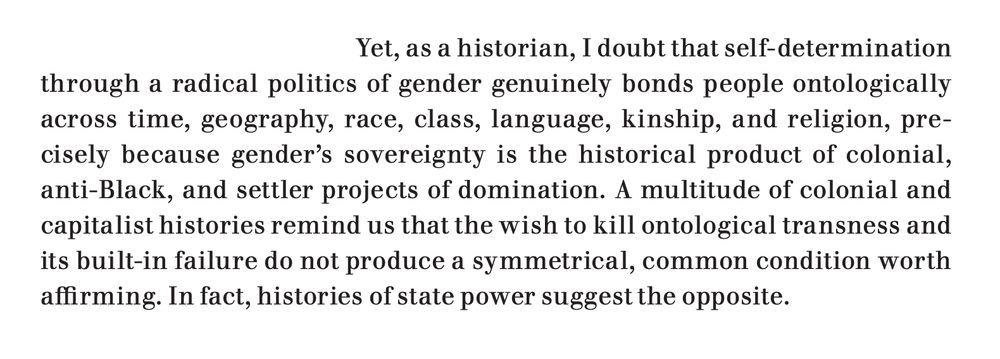
An excerpt from the linked article, which reads: "Yet, as a historian, I doubt that self-determination through a radical politics of gender genuinely bonds people ontologically across time, geography, race, class, language, kinship, and religion, precisely because gender’s sovereignty is the historical product of colonial, anti-Black, and settler projects of domination. A multitude of colonial and capitalist histories remind us that the wish to kill ontological transness and its built-in failure do not produce a symmetrical, common condition worth affirming. In fact, histories of state power suggest the opposite."
"Another way of cohabitating and coming to justice out of historical conflicts will remain elusive so long as we turn to gender to change the world" — from our latest issue, read Jules Gill-Peterson's "Who Is the Subject of Gender Self-determination?" here: read.dukeupress.edu/differences/...
08.01.2025 16:04 — 👍 2 🔁 1 💬 0 📌 0